Review: Met's New LOHENGRIN Is Thrillingly Sung but Close Your Eyes and Listen
Francois Girard’s Wagner Lets Beczala, Wilson, Goerke, Nikitin and Groissbeck Shine
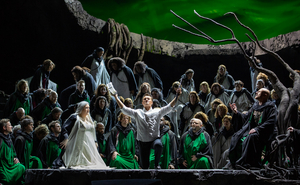
Photo: Marty Sohl/Met Opera
The Met's new production of Richard Wagner's LOHENGRIN showcases startlingly good singing from tenor Piotr Beczala in the title role, supported ably and nobly by soprano Tamara Wilson's Elsa, bass-baritone Evgeny Nikitin's Telramund and bass Gunther Groissbock's King Heinrich. And soprano Christine Goerke's evil Ortrud nearly steals the show. With the Met's orchestra and chorus in glorious form, led by music director Yannick Nezet-Seguin in the pit, the performance made you want to scream and yell for more.
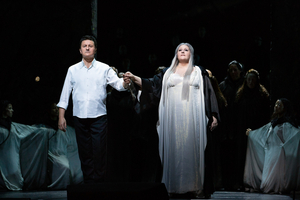
Marty Sohl/Met Opera
If you aren't familiar with LOHENGRIN-which could be true, since it hasn't been done at the Met in 17 years-here are some Spoiler Alerts, so skip this paragraph if you must! Lohengrin is a knight of the Holy Grail and is Parsifal's son! There is no live swan on stage-until he turns back into Elsa's brother!
Oh yes. Here's one more: Francois Girard--with his scenic and costume designer Tim Yap and lighting designer David Finn--may not have had an idea for the production, but it didn't stop them from doing it! (Girard knew a good thing when he saw it in Peter Flaherty's projections-but not to let it go on too long.) It's an abstract setting that's supposed to be both contemporary and fantastical; the result is a sort of worm's-eye-view of... Frankly, I'm not quite sure.
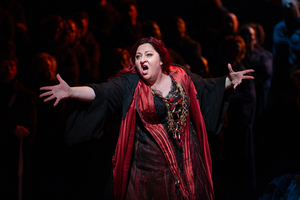
Why take this approach? Wagner set his opera in a pre-Belgium Antwerp, early in the 10th century. According to the program, the specificity of time and place is key to the tale; if so, why take an abstract approach?
But forget about the style of the show and think about the music, because it's well-worth cheering over, particularly with Nezet-Seguin on the podium to keep the romantic score in place, with its huge demands on the orchestra and chorus (under Donald Palumbo's wise leadership).
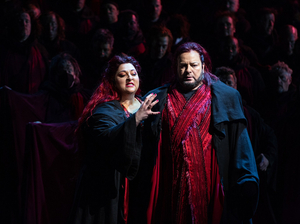
And then there are the principals: Tenor Beczala has been around the Met for quite some time, mainly in lyric roles like the Duke of Mantua, Rodolfo, and even Loris in FEDORA that opened on New Year's Eve. He hasn't given any real indication (maybe somewhere in his RUSALKA prince) that he was ready for prime time in Wagner. So it was a pleasure to hear the composer's music pour out of him, even if he was dressed like it was casual Friday at the office. (Shades of the director's take on PARSIFAL, where it worked.)
Beczala gave a stylish, straightforward and dignified performance, with not a hint of pushing the voice that captivated in RIGOLETTO; he sang ravishingly in his Act III love duet ("Das süsse lied verhallt") with Elsa, after the famed "Wedding March."
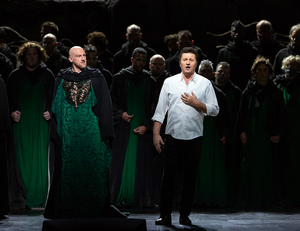
Photo: Marty Sohl/Met Opera
I've admired Wilson's voice since I first heard it a decade ago in Marschner's DER VAMPYR with the American Symphony Orchestra and I'm happy to say that it's only gotten bigger and better. She goes easily and smartly from the virginal character at the start of the opera, where her guardian Telramund falsely accuses her of killing her brother, to inherit his title, growing both dramatically and vocally as the story develops. This includes her major confrontation with Telramund's wife, the evil Ortrud (played with panache by Goerke), where Elsa must show she's no pushover for the villain of the piece.
It's a tribute to Goerke that she survives one of the worst pieces of the opera's staging, during the prelude to Act III, when she's forced to mime what seems like all three witches from MACBETH. (Choreography by Serge Bennathan.) She's a powerful stage presence who can bring Telramund to his knees and shows how capable she is of bringing her voice down into the mezzo territory that is called for in the role.
Bass Groissbock gives a stunningly rich performance as King Heinrich. Having seen him in the memorably cartoonish role of Baron Ochs in the Met's ROSENKAVALIER, his noble performance here gives insights into how can get singers and actors can get pigeonholed if they overstay their welcome in certain roles-and how they must be smart enough not to let it happen.
While bass-baritone Nikitin sometimes seemed a pawn in the hands of his wife, Ortrud, he otherwise took hold of the role of Telramund and almost made Lohengrin blink when he threatened him close-up, note to note. His level of anger at being stripped of his stature, was a frightening facet of his memorable performance. Baritone Brian Mulligan's notable singing gave the King's Herald big bones and presence-and was a clear reminder that small(er) roles don't mean lesser performers.
LOHENGRIN continues at the Met through April 1, including the March 18 matinee, which will be part of the Met's Live in HD series. For information about tickets, see the Met's website.
Reader Reviews

Videos

